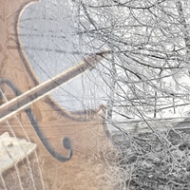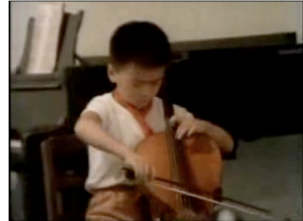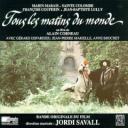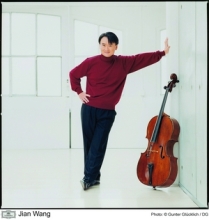“Bach has no shallow or transitory emotions, no momentary anger, no bad words or fleeting embraces – his emotions are as vast a scale as Shakespeare’s, yet common to all people on earth, from the most northerly to the most southerly races. We all weep when we suffer, we all know tears of joy. It is these fundamental emotions that Bach transmits in his suites.”
In fact, I think there is something kind of miraculous about this music — music written almost 300 years ago that at times is the essence of simplicity, particularly the broken-chord arpeggios that lead off the First Suite – as simple, Rostropovich said, as breathing: “The phrase generates energy (inhales) untill it reaches a certain point when it is released (exhales).” If that sounds too technical, it doesn’t when you hear it.
And out of this solo music Bach spins music more compelling than a symphony of a thousand, or a full-blown band with the volume turned up to 11.So all that got me to thinking about the juxtaposition of Bach and the movies, which after all are all about playing with our transitory emotions, fleeting embraces, and so on to create some usually mawkish, but very occasionally something profound and deeply moving.
Which then got me to thinking about one of my all-time favorite movies, Truly Madly Deeply, made in 1990, and starring a very un-Severus Snapeish Alan Rickman and the terrific English actress Juliet Stevenson, and directed by Anthony (”English Patient”) Minghella. The Ghost-like plot (also from the same year!) revolved around the relationship among dead-cellist Rickman, his wife-in-another-life Stevenson, and her new beau….and the music of Bach is so powerful it’s almost another character in the film.Bach’s soundtrack abilities have not been lost on other directors, it seems.
Turns that T,M,D is but one of 207 feature films that have been documented to use Bach’s music, with a surprisingly large percentage of them devoted to none other than the solo cello suites. And it seems that if you put a Bach solo-cello piece into your film, your chances of being nominated – or winning! some Oscar hardware go up exponentially. For certain film directors (hello Ingmar Bergman!), you might even call it “that old Bach magic.” On the other hand, a few directors have some explaining to do….Here’s
The Official List of Bach Cello Suites Used in Movie Soundtracks:
Another Woman – Gena Rowlands, Mia Farrow, Dir. Woody Allen, 1988
Cello Suite No. 6
 Antonia’s Line – Dir. Marleen Gorris (Netherlands) – 1996 1 Oscar: (Best Foreign Film)
Antonia’s Line – Dir. Marleen Gorris (Netherlands) – 1996 1 Oscar: (Best Foreign Film)
Cello Suite No. 1
 Autumn Sonata – Dir. Ingmar Bergman, 1978. 2 Oscar nominations (Best Actress – Ingrid Bergman; Original Screenplay: Ingmar Bergman)
Autumn Sonata – Dir. Ingmar Bergman, 1978. 2 Oscar nominations (Best Actress – Ingrid Bergman; Original Screenplay: Ingmar Bergman)
Cello Suite No. 4 [Sarabande]
The Company – Neve Campbell, dir. Robert Altman, 2003
Cello Suite No.1 [Minuet]
 Cries and Whispers –Dir. Ingmar Bergman, 1972. 5 Oscar nominations, (Best Picture, Best Director, Adapted Screenplay, Costume Design), 1 win (Best Cinematography – Sven Nykivst)
Cries and Whispers –Dir. Ingmar Bergman, 1972. 5 Oscar nominations, (Best Picture, Best Director, Adapted Screenplay, Costume Design), 1 win (Best Cinematography – Sven Nykivst)
Cello Suite No. 5
 Hilary & Jackie – Emily Watson, Rachel Griffiths, 1998. 2 Oscar nominations (Best Actress – Emily Watson; Supporting Actress – Rachel Griffiths)
Hilary & Jackie – Emily Watson, Rachel Griffiths, 1998. 2 Oscar nominations (Best Actress – Emily Watson; Supporting Actress – Rachel Griffiths)
Cello Suite No. 1 [Prélude & Gigue]
Cello Suite No. 3 [Prélude]
Cello Suite No. 6 [Gavotte]
The Hunger – Catherine Deneuve, David Bowie, Susan Sarandon 1983
Cello Suite No.1 [Prélude]
J´Embrasse Pas – Emmanuelle Béart, 1991 (France)
Cello Suite No.1 [Prélude]
Grey Knight, a/k/a The Killing Box – Corbin Bernsen, Billy Bob Thornton, Martin Sheen (1993)
Cello Suite No.1
Lost and Found – David Spade, 1999
Cello Suite No.1 [Prélude]
 Master and Commander: The Far Side of the World – Russell Crowe, dir. Peter Weir, 2003. 10 Oscar nominations (Best Picture, Director, Art Direction, Costume Design, Editing, Sound Mixing, Visual Effects, Makeup); 2 wins (Cinematography & Sound Editing)
Master and Commander: The Far Side of the World – Russell Crowe, dir. Peter Weir, 2003. 10 Oscar nominations (Best Picture, Director, Art Direction, Costume Design, Editing, Sound Mixing, Visual Effects, Makeup); 2 wins (Cinematography & Sound Editing)
Cello Suite No.1 [Prélude]
 Music of the Heart – Meryl Streep, West Craven (!), dir. 1999. 2 Oscar nominations: Best Actress (Streep); Original Song
Music of the Heart – Meryl Streep, West Craven (!), dir. 1999. 2 Oscar nominations: Best Actress (Streep); Original Song
Cello Suite No.1
 The Pianist – Adrian Brody, dir. Roman Polanski, 2002. 7 Oscar nominations (Best Picture, Cinematography, Editing, Costume Design); 3 wins (Best Director, Actor, Adapted Screenplay)
The Pianist – Adrian Brody, dir. Roman Polanski, 2002. 7 Oscar nominations (Best Picture, Cinematography, Editing, Costume Design); 3 wins (Best Director, Actor, Adapted Screenplay)
Cello Suite No. 1
The Prince and Me – Julia Stiles, dir. Martha Coolidge, 2004.
Cello Suite No.1 [Prélude]
A Simple Twist of Fate – Steve Martin, Gabriel Byrne, 1999.
Cello Suite No.1 [Prélude]
The Sleepy Time Gal – Jacqueline Bisset, 2001
Cello Suite No. 5
Small Time Crooks – Woody Allen, actor/dir, 2000
Cello Suite No. 2 [Sarabande]
 Through a Glass Darkly – Ingmar Bergman, 1961. 2 Oscar Nominations (Original Screenplay); 1 win (Best Foreign Film)
Through a Glass Darkly – Ingmar Bergman, 1961. 2 Oscar Nominations (Original Screenplay); 1 win (Best Foreign Film)
Cello Suite No. 2 [Sarabande]
 You Can Count on Me – Mark Ruffalo, Matthew Broderick, Kenneth Lonergran, writer/director, 2000. 2 Oscar nominations (Best Actress-Laura Linney; Best Writer – Kenneth Lonergan)
You Can Count on Me – Mark Ruffalo, Matthew Broderick, Kenneth Lonergran, writer/director, 2000. 2 Oscar nominations (Best Actress-Laura Linney; Best Writer – Kenneth Lonergan)
Cello Suite No. 1
Honorable Mention:
Yo-Yo Ma: Inspired by Bach – Atom Egoyan, five others (1997) – 2 Emmy AwardsNot a movie per se (although it was screened in other countries and at film festivals) about a decade ago Yo-Yo Ma made a series of six short films devoted to exploring the Bach solo cello suites from a different artist perspective, including, film, dance, and architecture. The best known (and probably most successful) of the six is Suite No. 4, Sarabande, directed by Atom Egoyan, which “tells the story of a failed relationship that culminates in the couple attending a Yo-Yo Ma performance of the piece at Roy Thomson Hall in Toronto.”
 Fanny and Alexander – Ingmar Bergman, 1982. 6 Oscar nominations, including Best Director & Screenplay; 4 wins (Foreign Film, Cinematogrpahy, Art Direction, Costume Design)
Fanny and Alexander – Ingmar Bergman, 1982. 6 Oscar nominations, including Best Director & Screenplay; 4 wins (Foreign Film, Cinematogrpahy, Art Direction, Costume Design)
Vast amounts of ink have been spilled about Bergman’s masterful use of music in the movies, particularly of Bach and Mozart. But in this film you won’t hear any of Bach cello suites; instead, Bergman makes the unorthodox choice of using the three solo cello suites written by English composer Benjamin Britten! (In fact, that’s Britten’s music you hear at the very opening of the film.)
Which brings us back to the beginning of this post, for Britten was also “inspired by Bach,” as it were….he wrote and dedicated the pieces to his close friend Mstislav Rostropovich after hearing the cellist play……..you guessed it, one of Bach’s solo suites.
By the way, a tip o’ the hat to Naxos, both for their work in promoting and recording soundtracks by dedicated film composers, as well as for putting together a nice new database of classical music at the movies.
There’s also a nice site called Classics of the Silver Screen.
Finally, if I ever get asked to choose a piece of Bach’s cello music for the silver screen, I think I’d pick this.













